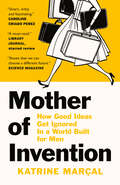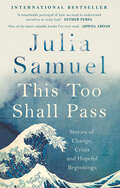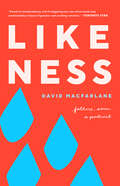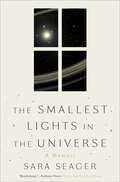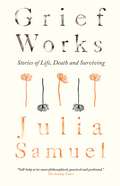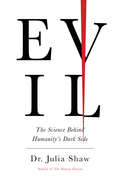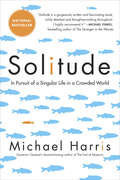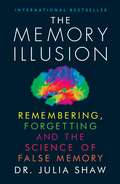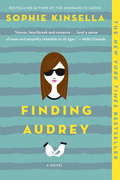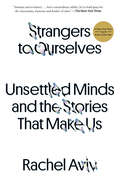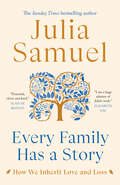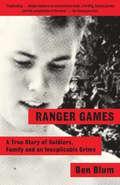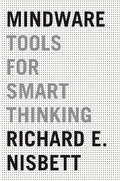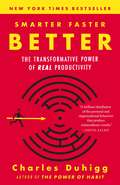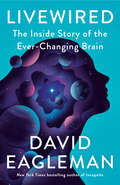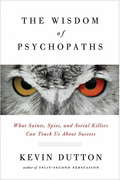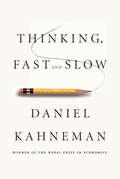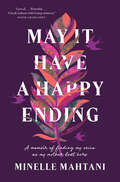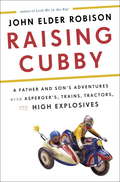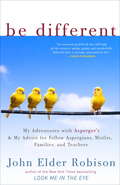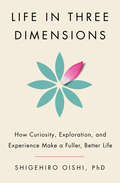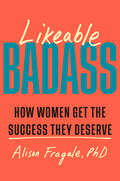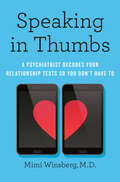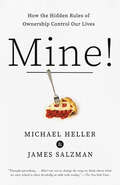- Table View
- List View
Mother of Invention: How Good Ideas Get Ignored in an Economy Built for Men
by Katrine MarcalAn illuminating and maddening examination of how gender bias has skewed innovation, technology, history and work.It all starts with a rolling suitcase. The wheel was invented some 5,000 years ago, and the modern suitcase in the mid-nineteenth century, but it wasn&’t until the 1970s that someone successfully married the two. What was the hold up? For writer and journalist Katrine Marçal, the answer is both shocking and simple: because "real men" carried their bags, no matter how heavy. There were rolling suitcases before the '70s, but they were marketed as a niche product for (the presumably few) women travelling alone, and the wheeled suitcase wasn't "invented" until it was no longer threatening to masculinity. Mother of Invention draws on this example and many others, from electric cars to tech billionaires, to show how gender bias stifles the economy and holds us back. Our traditional notions about men and women have delayed innovations, sometimes by hundreds of years, and have distorted our understanding of our history. While we talk about the Iron Age and the Bronze Age, we might as well talk about the Ceramic Age or the Flax Age, since these technologies were just as important. But inventions associated with women are not considered to be technology in the same way. Katrine Marçal&’s Mother of Invention is a fascinating examination of business, technology, and innovation through a feminist lens. Marçal takes us on a tour of the global economy, arguing that gendered assumptions dictate which businesses get funding, how we value work, and how we trace human progress. And it carries a powerful message: If we upend our biases, we can unleash our full potential, tackling climate change and wielding technology to become more human, rather than less.
This Too Shall Pass: Stories of Change, Crisis and Hopeful Beginnings
by Julia SamuelA leading therapist shares memorable patient stories to explore the key crises in life and what we can learn from them.If change is the natural order of things, why do so many people struggle with the milestones of life--from first jobs and first loves to children leaving home and retirement?We live in a culture of limitless choice--and life is now more complex than ever. In This Too Shall Pass, acclaimed psychotherapist Julia Samuel draws on hours of conversations with her patients to show how we can learn to adapt and thrive during our most difficult and transformative experiences. Illuminated by the latest social and psychological research, this book unflinchingly deals with the hard times in family, love, work, health and identity.From a woman deciding whether to leave her husband for a younger lover, to a father handling a serious medical diagnosis. And from a new mother struggling with the decision to return to work, to a young man dealing with the aftermath of coming out, and a woman starting over after losing her job.These twenty powerful, unforgettable and deeply intimate stories about everyday people will inform our understanding of our own unique response to change and enlighten the way we approach challenges at every stage of life.
Likeness: Fathers, sons, a portrait
by David MacfarlaneWhen the worst that can happen, happens, the only useful lesson is the knowledge that it can. That's the take-away: a world can actually end, time can actually run out, sadness can prevail. But I didn't know that then . . . From one of Canada's most celebrated writers and the author of the classic memoir The Danger Tree comes an occasionally hilarious, sometimes heart-breaking meditation on love, memory, and the fathomless depths of grief. Likeness is a multi-generational story told through the vehicle of a painting, a portrait of Macfarlane by the well-known Canadian artist, John Hartman. The painting has ended up unexpectedly, temporarily, and enormously in Macfarlane's living room. He looks at it—a lot. It's hard to avoid. To Macfarlane's surprise, the painting becomes a portal—not only into his own past, but into his father's, too. Through these two histories is woven the present—one dominated by illness. Macfarlane's son undergoes treatment for leukemia during the time the painting hangs in the family living room. Blake is a young man rich in creative possibility. There is music to be composed. There are films to be made. But Blake's future is as circumscribed by fate as his father's was wide open. A tragic difference, eloquently noted. Likeness can be very funny. But it is also inescapably, achingly sad. A book of transcendent beauty, Likeness demonstrates the power of memory to transform the tragic into the precious and profound.
The Smallest Lights in the Universe: A Memoir
by Sara SeagerCanadian MIT astrophysicist Sara Seager interweaves the story of her search for meaning and solace after losing her first husband to cancer, her unflagging search for an Earth-like exoplanet and her unexpected discovery of new love.Sara Seager has made it her life's work to peer into the spaces around stars--looking for exoplanets outside our solar system, hoping to find the one-in-a-billion world enough like ours to sustain life. But with the unexpected death of her husband, her life became an empty, lightless space. Suddenly, she was the single mother of two young boys, a widow at forty, clinging to three crumpled pages of instructions her husband had written for things like grocery shopping--things he had done while she did pioneering work as a planetary scientist at MIT. She became painfully conscious of her Asperger's, which before losing her husband had felt more like background noise. She felt, for the first time, alone in the universe.In this probing, invigoratingly honest memoir, Seager tells the story of how, as she stumblingly navigated the world of grief, she also kept looking for other worlds. She continues to develop groundbreaking projects, such as the Starshade, a sunflower-shaped instrument that, when launched into space, unfurls itself so as to block planet-obscuring starlight, and she takes solace in the alien beauty of exoplanets. At the same time, she discovers what feels every bit as wondrous: other people, reaching out across the space of her grief. Among them are the Widows of Concord, a group of women offering consolation and advice, and her beloved sons, Max and Alex. Most unexpected of all, there is another kind of one-in-a-billion match with an amateur astronomer. Equally attuned to the wonders of deep space and human connection, The Smallest Lights in the Universe is its own light in the dark.
Grief Works: Stories of Life, Death and Surviving
by Julia SamuelA warm, moving and practical guide to grief from a leading bereavement counsellor, Grief Works features deeply affecting case studies of the author's clients, which will appeal to readers of Atul Gawande's Being Mortal, Stephen Grosz's The Unexamined Life and Paul Kalanithi's When Breath Becomes Air. <P><P>Death is the last taboo in our society, and grief is still profoundly misunderstood. So many of us feel awkward and uncertain around death, and shy away from talking honestly with family and friends. <P><P>Grief Works is a compassionate guide that will inform and engage anyone who is grieving, from the "expected" death of a parent to the sudden unexpected death of a small child, and provide clear advice for those seeking to comfort the bereaved. <P><P>With deeply moving case studies of real people's stories of loss, and brilliantly accessible and practical advice, Grief Works will be passed down through generations as the definitive guide for anyone who has lost a loved one, and revolutionize the way we talk about life, loss and death.
Evil: The Science Behind Humanity's Dark Side
by Julia ShawAn original and scientifically rigorous exploration of the darkest recesses of the human mind.What is it about evil that we find so compelling? From our obsession with serial killers to violence in pop culture, we seem inescapably drawn to the stories of monstrous acts and the aberrant people who commit them. But evil, Dr. Julia Shaw argues, is all relative, rooted in our unique cultures. What one may consider normal, like sex before marriage, eating meat or being a banker, others may find abhorrent. And if evil is only in the eye of the beholder, can it be said to exist at all?In Evil, Dr. Shaw uses case studies from academia, examples from popular culture and anecdotes from everyday life to break down complex information and concepts such as the neuroscience of evil, the psychology of bloodlust and workplace misbehaviour. In grappling with thorny dilemmas--from "Would I kill baby Hitler?" to "Why do I want to murder my spouse?"--Dr. Shaw offers readers a better understanding of the world, ourselves and our Google search histories.
Solitude: A Singular Life in a Crowded World
by Michael HarrisGovernor General's Award-winner Michael Harris explores the profound emotional and intellectual benefits of solitude, and how we may achieve it in our fast-paced world.The capacity to be alone--properly alone--is one of life's subtlest skills. Real solitude is a contented and productive state that garners tangible rewards: it allows us to reflect and recharge, improving our relationships with ourselves and, paradoxically, with others. Today, the zeitgeist embraces sharing like never before. Fueled by our dependence on online and social media, we have created an ecosystem of obsessive distraction that dangerously undervalues solitude. Many of us now lead lives of strangely crowded loneliness--we are ever-connected, but only shallowly so. Award-winning author Michael Harris examines why our experience of solitude has become so impoverished, and how we may grow to love it again in the frenzy of our digital landscape. Solitude is an optimistic and encouraging story about discovering true quiet inside the city, inside the crowd, inside our busy and urbane lives. Harris guides readers away from a life of ceaseless pings toward a state of measured connectivity, one that balances solitude and companionship. Rich with true stories about the life-changing power of solitude, and interwoven with reporting from the world's foremost brain researchers, psychologists and tech entrepreneurs, Solitude is a beautiful and prescriptive statement on the benefits of being alone.
The Memory Illusion: Why You Might Not Be Who You Think You Are
by Julia ShawForensic psychologist and memory expert Dr. Julia Shaw reveals why we are all unreliable narrators of our own life stories.Think you have a good memory? Think again. Memories are our most cherished possessions. We rely on them every day of our lives. They make us who we are. And yet the truth is they are far from being the accurate record of the past we like to think they are. True, we can all admit to having suffered occasional memory lapses, such as entering a room and immediately forgetting why, or suddenly being unable to recall the name of someone we've met dozens of times. But what if we have the potential for more profound errors of memory, even verging on outright fabrication and self-deception? In The Memory Illusion, forensic psychologist and memory expert Dr. Julia Shaw uses the latest research to show the astonishing variety of ways in which our brains can indeed be led astray. She shows why we can sometimes misappropriate other people's memories, subsequently believing them to be our own. She explains how police officers can imprison an innocent man for life on the basis of 300 denials and just one confession. She demonstrates the way radically false memories can be deliberately implanted, leading people to believe that they brutally murdered a loved one, or were abducted by aliens. And she reveals how, in spite of all this, we can improve our memory through simple awareness of its fallibility. Fascinating and unnerving in equal measure, The Memory Illusion offers a unique insight into the human brain, challenging you to question how much you can ever truly know about yourself.
Finding Audrey
by Sophie Kinsella<P>From the #1 New York Times bestselling author of the Shopaholic series comes a terrific blend of comedy, romance, and psychological recovery in a contemporary YA novel sure to inspire and entertain. <P>An anxiety disorder disrupts fourteen-year-old Audrey's daily life. She has been making slow but steady progress with Dr. Sarah, but when Audrey meets Linus, her brother's gaming teammate, she is energized. She connects with him. Audrey can talk through her fears with Linus in a way she's never been able to do with anyone before. As their friendship deepens and her recovery gains momentum, a sweet romantic connection develops, one that helps not just Audrey but also her entire family. <P><b> Nominee for the 2018 Young Reader's Choice Award </b> <i>(Pacific Northwest Library Association)</i>
Strangers to Ourselves: Unsettled Minds and the Stories That Make Us
by Rachel AvivThe highly anticipated debut from the acclaimed award-winning New Yorker writer Rachel Aviv compels us to examine how the stories we tell about mental illness shape our sense of who we are.Strangers to Ourselves poses fundamental questions about how we understand ourselves in periods of crisis and distress. Drawing on deep, original reporting as well as unpublished journals and memoirs, Rachel Aviv writes about people who have come up against the limits of psychiatric explanations for who they are. She follows an Indian woman celebrated as a saint who lives in healing temples in Kerala; an incarcerated mother vying for her children's forgiveness after recovering from psychosis; a man who devotes his life to seeking revenge upon his psychoanalysts; and an affluent young woman who, after a decade of defining herself through her diagnosis, decides to go off her meds because she doesn't know who she is without them. Animated by a profound sense of empathy, Aviv's gripping exploration is refracted through her own account of living in a hospital ward at the age of six and meeting a fellow patient with whom her life runs parallel—until it no longer does.Aviv asks how the stories we tell about mental disorders shape their course in our lives—and our identities, too. Challenging the way we understand and talk about illness, her account is a testament to the porousness and resilience of the mind.
Every Family Has a Story: How We Inherit Love and Loss
by Julia SamuelWith her usual warmth and wisdom, bestselling psychotherapist Julia Samuel explores the family: what we inherit and how we can change.Relationships fundamentally influence our health and happiness--and family is the only relationship we cannot leave, however much we might like to. And yet we often think too narrowly about the impact of our families on our lives.Every Family Has A Story sees bestselling psychotherapist Julia Samuel turn from her work with individuals to her sessions with a wide variety of families, revealing how deeply we are influenced by them. Diving into eight case studies, she analyzes a range of common issues, including separation, step-relationships, leaving home, trauma and loss. These insights inform her 12 touchstones for family wellbeing--from fighting productively, to making time for rituals; from setting boundaries, to allowing difference--equipping us with valuable tools to become better family members. Revealing acts of forgiveness and learning amidst trauma and hardship, Samuel offers universal insights into how families can face challenges together, providing an honest and compassionate meditation on what we inherit, and how we can create the families we wish for.
Ranger Games: A Story of Soldiers, Family and an Inexplicable Crime
by Ben BlumIn the tradition of Truman Capote and Jon Krakauer, a brilliant exploration of an inexplicable crime and its devastating consequences for the author's family.As a child Ben Blum was a math prodigy adrift in a family of alpha males, foremost among them his first cousin Alex, an immensely popular high school hockey star who had one unshakeable goal in life: endure a brutally difficult training course, become a U.S. Army Ranger and fight terrorists for his country. He succeeded, but on the last day of his leave before deployment, Alex got into his car with two fellow soldiers and two strangers, drove to a local bank in Tacoma and committed armed robbery. The question that haunted Ben, the entire Blum family and even Alex was: Why? Alex didn't need money--his family was well off. He had never had the slightest trouble with the law. He believed passionately in the Ranger's creed, which emphasized honour above all. At first, Alex insisted he thought the robbery was just another exercise in the famously daunting Ranger training program. His attorney presented a case based on the theory that the Ranger indoctrination mirrored that of a cult. Or was it the influence of the soldier who planned the robbery, Alex's superior, Luke Elliott Sommer, a charismatic combat veteran full of swagger and grandiose schemes? Facing his own personal crisis, and in the hopes of helping both Alex and his splintering family cope, Ben delved into these mysteries, growing closer to Alex in the process. As he probed further, he also came to know Sommer, whose manipulative tendencies, combined with a magnetic personality, lured Ben into a relationship that put his loyalties to the test. Intricate, heartrending and morally urgent, Ranger Games is a true crime story like no other. Ben's enormous compassion for his cousin deepens and complicates his search for the answers to profound questions of guilt and innocence, conformity and free will, truth and lies, right and wrong, and how far crisis can stretch the bonds of family.
Mindware
by Richard NisbettLearn how to think more effectively, at work and at home. Many scientific and philosophical ideas are so powerful that they can be applied to our lives at home and work and school to help us think smarter and more effectively about our behaviour and the world around us. Surprisingly, many of these ideas remain unknown to most of us. In Mindware, the world-renowned psychologist Richard Nisbett presents these ideas in clear and accessible detail, offering a tool kit for better thinking and wiser decisions. He has made a distinguished career of studying and teaching such powerful problem-solving concepts as the law of large numbers, statistical regression, cost-benefit analysis, sunk costs and opportunity costs, and causation and correlation, probing how best to teach others to use them effectively in their daily lives. In this groundbreaking book, he shows that a course in a given field--statistics or economics, for example--often doesn't work as well as a few minutes of more practical instruction in analyzing everyday situations. Mindware shows how to reframe common problems in such a way that these powerful scientific and statistical concepts can be applied to them. The result is an enlightening and practical guide to the most powerful tools of reasoning ever developed--tools that can easily be used to make better professional, business and personal decisions.
Smarter Faster Better
by Charles Duhigg<P>From the bestselling author of The Power of Habit comes a fascinating new book exploring the science of productivity, and why, in today's world, managing how you think--rather than what you think about--can transform your life. <P>Productivity, recent studies suggest, isn't always about driving ourselves harder, working faster and pushing ourselves toward greater "efficiency." Rather, real productivity relies on managing how we think, identify goals, construct teams and make decisions. The most productive people, companies and organizations don't merely act differently--they envision the world and their choices in profoundly different ways. <P> This book explores eight concepts that are critical to increasing productivity. It takes you into the cockpit of two passenger jets (one crashes) to understand the importance of constructing mental models--telling yourself stories about yourself in order to subconsciously focus on what really matters. <P>It introduces us to basic training in the U.S. Marine Corps, where the internal locus of control is exploited to increase self-motivation. ' <P>It chronicles the outbreak of Israel's Yom Kippur War to examine cognitive closure--a dangerous trap that stems from our natural desire to feel productive and check every last thing off our to-do lists, causing us to miss obvious risks and bigger opportunities. <P>It uses a high-achieving public school in Cincinnati to illuminate the concept of disfluency, which holds that we learn faster and more deeply when we make the data harder to absorb. <P>It shows how the principles of lean manufacturing--in which decision-making power is pushed to the lowest levels of the hierarchy--allowed the FBI to produce a software system that had eluded them for years. <P>It explores how Disney made Frozen into a record success by encouraging tension among animation teams--a version of what biologists refer to as the Intermediate Disturbance Hypothesis, which posits that nature is most creative when crises occur. <P>With the combination of relentless curiosity, deep reporting and rich storytelling that defined The Power of Habit, Charles Duhigg takes readers from neurology laboratories to Google's brainstorming sessions and illustrates how we can all increase productivity in our lives. <P><b>A New York Times Bestseller</b>
Livewired: The Inside Story of the Ever-Changing Brain
by David EaglemanYou will never think about your brain in the same way again. The brain is often portrayed as an organ with different regions dedicated to specific tasks. But that textbook model is wrong. The brain is a dynamic system, constantly modifying its own circuitry to match the demands of the environment and the body in which it finds itself. If you were to zoom into the living, microscopic cosmos inside the skull, you would witness tentacle-like extensions grasping, bumping, sensing, searching for the right connections to establish or forego, like denizens of a country establishing friendships, marriages, neighbourhoods, political parties, vendettas, and social networks. It's a mysterious kind of computational material, an organic three-dimensional textile that adjusts itself to operate with maximum efficiency. The brain is not hardwired, David Eagleman contends--it is livewired. With his new theory of infotropism, Eagleman demonstrates why the fundamental principle of the brain is information maximization: in the same way that plants grow toward light, brains reconfigure to boost data from the outside world. Follow Eagleman on a thrilling journey to discover how a child can function with one half of his brain removed, how a blind man can hit a baseball via a sensor on his tongue, how new devices and body plans can enhance our natural capacities, how paralyzed people will soon be able to dance in thought-controlled robotic suits, how we can build the next generation of devices based on the principles of the brain, and what all this has to do with why we dream at night.
The Wisdom of Psychopaths
by Kevin DuttonPsychopath. The word conjurs up images of serial killers, rapists, suicide bombers, gangsters. But think again: you could probably benefit from being a little more psychopathic yourself.Psychologist Kevin Dutton has made a speciality of psychopathy, and is on first-name terms with many notorious killers. But unlike those incarcerated psychopaths, and all those depicted in movies and crime fiction, most are not violent, he explains. In fact, says Prof Dutton, they have a lot of good things going for them. Psychopaths are fearless, confident, charismatic and focused--qualities tailor-made for success in today's society.The Wisdom of Psychopaths is an intellectual rollercoaster ride that combines lightning-hot science with unprecedented access to secret monasteries, Special Forces training camps, and high-security hospitals. In it, you will meet serial killers, war heroes, financiers, movie stars and attorneys--and discover that beneath the hype and popular characterization, psychopaths have something to teach us. Like the knobs on a mixing deck, psychopathy is graded. And finding the right combination of psychopathic traits, sampled and mixed at carefully calibrated volumes, can put us ahead of the game.
Thinking, Fast and Slow
by Daniel Kahneman<P>The guru to the gurus at last shares his knowledge with the rest of us. Nobel laureate Daniel Kahneman's seminal studies in behavioral psychology, behavioral economics, and happiness studies have influenced numerous other authors, including Steven Pinker and Malcolm Gladwell. <P>In Thinking, Fast and Slow, Kahneman at last offers his own, first book for the general public. It is a lucid and enlightening summary of his life's work. It will change the way you think about thinking. <P>Two systems drive the way we think and make choices, Kahneman explains: System One is fast, intuitive, and emotional; System Two is slower, more deliberative, and more logical. Examining how both systems function within the mind, Kahneman exposes the extraordinary capabilities as well as the biases of fast thinking and the pervasive influence of intuitive impressions on our thoughts and our choices. Engaging the reader in a lively conversation about how we think, he shows where we can trust our intuitions and how we can tap into the benefits of slow thinking, contrasting the two-system view of the mind with the standard model of the rational economic agent. <P>Kahneman's singularly influential work has transformed cognitive psychology and launched the new fields of behavioral economics and happiness studies. In this path-breaking book, Kahneman shows how the mind works, and offers practical and enlightening insights into how choices are made in both our business and personal lives--and how we can guard against the mental glitches that often get us into trouble. <P><b>A New York Times Bestseller</b>
May It Have a Happy Ending: A Memoir of Finding My Voice as My Mother Lost Hers
by Minelle MahtaniA searing, intimate and blisteringly honest memoir about mothers and daughters, grief and healing, and finding your voice.Minelle Mahtani had taken a leap of faith. A new mother in a new life, she'd moved across the country for love, and soon found herself facing the exciting and terrifying prospect of hosting her own radio show. But as she began to find her place in the majority white newsroom, she was handed devastating news: her Iranian mother had been diagnosed with tongue cancer.Just as Minelle was finding her voice, her mother was losing hers.What does it mean to amplify the voices of others while the stories of your ancestors are being buried in your mother's mouth? Why do we cling to superstition and luck when we&’ve lost all faith in healing those we love? And how do we juggle bearing the burden of looking after an ill parent when we are trying to parent our own children?In exquisitely lyrical and inventive prose, Mahtani recounts the experience so many of us recognize: a life calibrated through calculating when to speak and when to be silent in a world that feels like it forces us to be broken.
May It Have a Happy Ending: A Memoir of Finding My Voice as My Mother Lost Hers
by Minelle MahtaniA searing, intimate and blisteringly honest memoir about mothers and daughters, grief and healing, and finding your voice.Minelle Mahtani had taken a leap of faith. A new mother in a new life, she'd moved across the country for love, and soon found herself facing the exciting and terrifying prospect of hosting her own radio show. But as she began to find her place in the majority white newsroom, she was handed devastating news: her Iranian mother had been diagnosed with tongue cancer.Just as Minelle was finding her voice, her mother was losing hers.What does it mean to amplify the voices of others while the stories of your ancestors are being buried in your mother's mouth? Why do we cling to superstition and luck when we&’ve lost all faith in healing those we love? And how do we juggle bearing the burden of looking after an ill parent when we are trying to parent our own children?In exquisitely lyrical and inventive prose, Mahtani recounts the experience so many of us recognize: a life calibrated through calculating when to speak and when to be silent in a world that feels like it forces us to be broken.
Raising Cubby
by John Elder RobisonThe slyly funny, sweetly moving memoir of an unconventional dad's relationship with his equally offbeat son--complete with fast cars, tall tales, homemade explosives, and a whole lot of fun and trouble Misfit, truant, delinquent. John Robison was never a model child, and he wasn't a model dad either. Diagnosed with Asperger's syndrome at the age of forty, he approached fatherhood as a series of logic puzzles and practical jokes. When his son, Cubby, asked, "Where did I come from?" John said he'd bought him at the Kid Store and that the salesman had cheated him by promising Cubby would "do all chores." He read electrical engineering manuals to Cubby at bedtime. He told Cubby that wizards turned children into stone when they misbehaved. Still, John got the basics right. He made sure Cubby never drank diesel fuel at the automobile repair shop he owns. And he gave him a life of adventure: By the time Cubby was ten, he'd steered a Coast Guard cutter, driven a freight locomotive, and run an antique Rolls Royce into a fence. The one thing John couldn't figure out was what to do when school authorities decided that Cubby was dumb and stubborn--the very same thing he had been told as a child. Did Cubby have Asperger's too? The answer was unclear. One thing was clear, though: By the time he turned seventeen, Cubby had become a brilliant chemist--smart enough to make military-grade explosives and bring state and federal agents calling. Afterward, with Cubby facing up to sixty years in prison, both father and son were forced to take stock of their lives, finally coming to terms with being "on the spectrum" as both a challenge and a unique gift. By turns tender, suspenseful, and hilarious, this is more than just the story of raising Cubby. It's the story of a father and son who grow up together. Praise for John Robison's first book, Look Me In the Eye:"Lean, powerful in its descriptive accuracy and engaging in its understated humor...Emotionally gripping." --Chicago Tribune"A fantastic life story told with grace, humor, and a bracing lack of sentimentality." --Entertainment Weekly"Endearing...Robison is a natural storyteller." --Boston Globe
Be Different: Adventures of a Free-range Aspergian
by John Elder Robison"I believe those of us with Asperger's are here for a reason, and we have much to offer. This book will help you bring out those gifts." In his bestselling memoir, Look Me in the Eye, John Elder Robison described growing up with Asperger's syndrome at a time when the diagnosis didn't exist. He was intelligent but socially isolated; his talents won him jobs with toy makers and rock bands but did little to endear him to authority figures and classmates, who were put off by his inclination to blurt out non sequiturs and avoid eye contact. By the time he was diagnosed at age forty, John had already developed a myriad of coping strategies that helped him achieve a seemingly normal, even highly successful, life. In Be Different, Robison shares a new batch of endearing stories about his childhood, adolescence, and young adult years, giving the reader a rare window into the Aspergian mind.In each story, he offers practical advice--for Aspergians and indeed for anyone who feels "different"--on how to improve the weak communication and social skills that keep so many people from taking full advantage of their often remarkable gifts. With his trademark honesty and unapologetic eccentricity, Robison addresses questions like: * How to read others and follow their behaviors when in uncertain social situations * Why manners matter * How to harness your powers of concentration to master difficult skills * How to deal with bullies * When to make an effort to fit in, and when to embrace eccentricity * How to identify special gifts and use them to your advantage. Every person, Aspergian or not, has something unique to offer the world, and every person has the capacity to create strong, loving bonds with their friends and family. Be Different will help readers and those they love find their path to success.
Life in Three Dimensions: How Curiosity, Exploration, and Experience Make a Fuller, Better Life
by Shigehiro Oishi PhDA NEXT BIG IDEA CLUB MUST-READ BOOK • From one of our foremost psychologists, a trailblazing book that turns the idea of a good life on its head and urges us to embrace the transformative power of variety and experienceFor many people, a good life is a stable life, a comfortable life that follows a well-trodden path. This is the case for Shigehiro Oishi's father, who has lived in a small mountain town in Japan for his entire life, putting his family's needs above his own, like his father and grandfather before him. But is a happy life, or even a meaningful life, the only path to a good life?In Life in Three Dimensions, Shige Oishi enters into a debate that has animated psychology since 1984, when Ed Diener (Oishi's mentor) published a paper that launched happiness studies. A rival followed in 1989 with a model of a good life that focused on purpose and meaning instead. In recent years, Shige Oishi's award-winning work has proposed a third dimension to a good life: psychological richness, a concept that prioritizes curiosity, exploration, and a variety of experiences that help us grow as people.Life in Three Dimensions explores the shortcomings of happiness and meaning as guides to a good life, pointing to complacency and regret as a "happiness trap" and narrowness and misplaced loyalty as a &“meaning trap.&” Psychological richness, Oishi proposes, balances the other two, offering insight and growth spurred by embracing uncertainty and challenges. In a lively style, drawing on a generation of psychological studies and on examples from famous people, books and film, Oishi introduces a new path to a fuller, more satisfying life with fewer regrets.
Likeable Badass: How Women Get the Success They Deserve
by Alison FragaleBehavioral scientist Alison Fragale offers powerful new insights and a practical playbook for women to advance in any workplace, full of tips, tricks, and strategies to help secure that elusive corner office.Over decades of research, speaking engagements, and mentorship, psychologist and professor Alison Fragale encountered recurring questions from high powered and early career women alike: How do women thread the needle of kindness and competence in the workplace? How can women earn credit for their accomplishments, negotiate better, and navigate complex office politics without losing the goodwill of their peers?Fragale investigated and determined that many women's workplace issues boil down to what psychologists call status: the perception of them by others. No amount of power-- no degree, title, or paycheck-- will raise a woman's workplace stature unless it also affects how others see her. Acknowledging this roadblock, Fragale pulls back the curtain on how we can change how others see us by developing our standing as a "likeable badass." By cultivating perceptions of warmth and assertiveness, women can achieve the kind of reputation that leads to a seat at the table and a fulfilling career path.Likeable Badass is equal parts behavioral science and life hacks, weaving together rigorous research with actionable advice and impactful stories from a diverse array of women. This is a warm, heartening book written for women, their allies, and anyone who struggles to rise, and wants evidence-based, practical strategies for success, served with a side of inspiration and humor.
Speaking in Thumbs: A Psychiatrist Decodes Your Relationship Texts So You Don't Have To
by Mimi WinsbergAn essential look at the love language of texts, helping you decipher the personalities of online daters, the subtle signals from your romantic partner, and the red flags hiding in plain sight.When it comes to modern relationships, our thumbs do the talking. We swipe right into a stranger's life, flirt inside text bubbles, spill our hearts onto the screen, use emojis to convey desire, frustration, rage. Where once we pored over love letters, now we obsess over response times, or wonder why the three-dot ellipsis came . . . and went.Nobody knows this better than Dr. Mimi Winsberg. A Harvard- and Stanford-trained psychiatrist, she cofounded a behavioral health startup while serving as resident psychiatrist at Facebook. Her work frequently finds her at the intersection of Big Data and Big Dating. Like all of us, Winsberg has been handed a smartphone accompanied by the urgent plea: "What does this mean?" Unlike all of us, she knows the answer. She is a text whisperer.Speaking in Thumbs is a lively and indispensable guide to interpreting our most important medium of communication. Drawing from of-the-moment research and a treasure trove of real-life online dating chats, including her own, Winsberg helps you see past the surface and into the heart of the matter. What are the hallmarks of healthy attachment? How do we recognize deception? How can we draw out that important-but-sensitive piece of information--Do you want kids? Do you use drugs? Are you seeing someone else?--without sending a potential partner heading for the hills?Insightful, timely, and impossible to put down, Speaking in Thumbs is an irresistible guide to the language of love. With wit and compassion, Winsberg empowers you to find and maintain real connection by reading between the lines.
Mine!: How the Hidden Rules of Ownership Control Our Lives
by James Salzman Michael A. HellerA hidden set of rules governs who owns what--explaining everything from whether you can recline your airplane seat to why HBO lets you borrow a password illegally--and in this lively and entertaining guide, two acclaimed law professors reveal how things become "mine.""Mine" is one of the first words babies learn. By the time we grow up, the idea of ownership seems natural, whether buying a cup of coffee or a house. But who controls the space behind your airplane seat: you reclining or the squished laptop user behind? Why is plagiarism wrong, but it's okay to knock-off a recipe or a dress design? And after a snowstorm, why does a chair in the street hold your parking space in Chicago, but in New York you lose the space and the chair?Mine! explains these puzzles and many more. Surprisingly, there are just six simple stories that everyone uses to claim everything. Owners choose the story that steers us to do what they want. But we can always pick a different story. This is true not just for airplane seats, but also for battles over digital privacy, climate change, and wealth inequality. As Michael Heller and James Salzman show--in the spirited style of Freakonomics, Nudge, and Predictably Irrational--ownership is always up for grabs.With stories that are eye-opening, mind-bending, and sometimes infuriating, Mine! reveals the rules of ownership that secretly control our lives.
